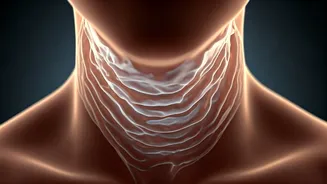Why It Happens
Waking up with a dry throat is a frequent occurrence, often caused by factors that disrupt the natural moistening of the throat during sleep. Mouth breathing
is a primary culprit, as it bypasses the nasal passages' humidifying function, leading to air directly hitting the throat and drying it out. Other contributing elements include dehydration, wherein the body lacks adequate fluids to maintain moisture levels, and dry indoor air, especially prevalent during colder months when heaters reduce humidity. Furthermore, conditions like allergies or post-nasal drip can trigger throat irritation and dryness. Even sleep apnea or snoring, which causes mouth breathing, can result in the same symptom. Understanding these different aspects is the first step towards identifying the underlying cause and finding effective solutions.
Mouth Breathing's Role
Mouth breathing is a major contributor to a parched throat upon waking. Typically, when we sleep, we breathe through our noses, which filters and humidifies the air before it reaches the lungs and throat. If the nasal passages are blocked or if we habitually breathe through the mouth, the air bypasses this critical process. This direct exposure of the throat to dry air leads to the throat drying out, causing the sensation of dryness and irritation. This can be caused by various factors, including nasal congestion from allergies, colds, or anatomical issues. Habitual mouth breathing, therefore, disrupts the normal process of air humidification, which causes the throat to feel dry and uncomfortable in the morning.
Dehydration Explained
Dehydration is another significant reason for throat dryness upon waking. When the body doesn't have enough fluids, it struggles to maintain the necessary moisture levels in the mucous membranes that line the throat. This lack of hydration makes the throat more susceptible to dryness and irritation, especially during sleep when the body naturally slows down fluid intake. Dehydration can be caused by various factors, including insufficient fluid intake throughout the day, excessive fluid loss through sweating or illness, and the use of certain medications that may have diuretic effects. Ensuring adequate hydration throughout the day is crucial to combat dryness, with regular intake of water and other hydrating fluids being the most effective means to ensure optimal moisture levels and a comfortable throat environment during sleep.
Dry Indoor Air
The air quality of your sleeping environment also influences throat dryness. Dry indoor air, particularly common during winter when heating systems reduce humidity levels, can significantly contribute to the problem. The dry air pulls moisture from the throat's delicate tissues, resulting in dryness and discomfort upon waking. Air conditioning can have a similar effect by removing moisture from the air. This problem is exacerbated in environments with poor ventilation or high levels of dust and allergens, which can further irritate the throat. To counter this, using a humidifier in the bedroom can add moisture to the air. Regular cleaning to reduce dust and allergens is also helpful, ensuring the air remains conducive to maintaining optimal throat moisture during the night.
Other Potential Causes
Beyond mouth breathing, dehydration, and dry air, a variety of other factors can contribute to morning throat dryness. Allergies and post-nasal drip, where excess mucus drains down the throat, can irritate and dry out the throat tissues. Certain medications, especially those with anticholinergic effects, can reduce saliva production, leading to a dry mouth and throat. Medical conditions such as acid reflux can cause stomach acid to reach the throat during sleep, causing irritation and dryness. Sleep apnea and snoring, both of which often involve mouth breathing, can also worsen the problem. Identifying these additional elements can guide targeted management and ensure overall health and well-being. Consulting a healthcare professional is crucial to diagnose and properly treat any underlying medical condition.
Finding Relief
Alleviating morning throat dryness requires addressing the root causes and implementing strategies for symptom management. If mouth breathing is the issue, techniques such as taping the mouth lightly or using nasal strips can encourage nasal breathing. Staying well-hydrated by drinking water throughout the day is essential, while also avoiding excessive caffeine or alcohol, which can cause dehydration. Using a humidifier in the bedroom can add moisture to the air and reduce dryness. Furthermore, considering medical advice is important for the management of allergies, post-nasal drip, or acid reflux, with treatments varying from antihistamines and nasal sprays to lifestyle changes, like elevating the head during sleep and avoiding late-night meals. If sleep apnea or snoring are suspected, medical intervention might be necessary.





















